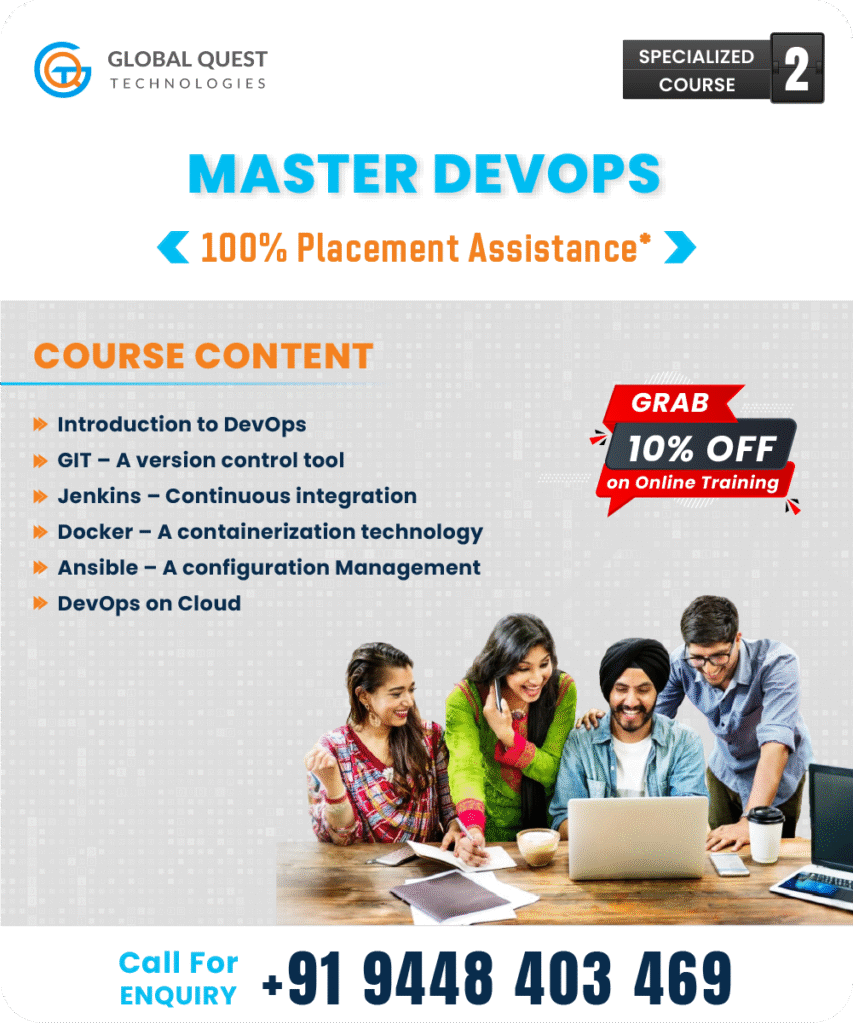
We go over all the prerequisites needed to acquire a fantastic job, from the ground up.
Providing complete assistance with the preparation to crack the interviews
We are assisting in finding better and more relevant job openings.
Thorough guidance ensures the students gain the best out of the course.
Our institute provides comprehensive DevOps training, equipping you with essential skills in automation, CI/CD pipelines, and cloud deployment. With hands-on experience, expert-led sessions, and real-world projects, we prepare you for a successful career in DevOps and cloud engineering. Join us to stay ahead in the evolving tech industry!
Raghu is a B. E. in Computer Science and Engineering and has teaching experience of over 4.5 years. His expertise comprises Full Stack Java Development, Cyber security, A.W.S., Networking, Python Development and many more. He also possesses various certifications, including JAVA HackerRank, Oracle Certificatified Java Professional-8, Network Security Professional, and Azure - Az900.
Mr. Subramanya Swamy H N has been implementing his passion towards teaching from the past 10+ years. He teaches any complex topic in a very simpler manner by giving real time examples such that even naive can easily understands the subject in a crystal clear manner. He is handling Java Full Stack Development, Python Full Stack Development, Devops with AWS, Dotnet Full Stack Development.
8.1. Create EBS Volumes
8.2. Delete EBS Volumes
8.3. Attach and Detach EBS Volumes with EC2 instance
8.4. Creating and Deleting Snapshots
9.1. Understanding S3 durability and redundancy
9.2. Introduction about S3 Buckets
9.3. How S3 Uploading works and how to Download
9.4. How to S3 Permissions
9.5. How to implement S3 Object Versioning S3 Lifecycle Policies
9.6. Storage Gateways
9.7. Import Export
9.8. S3 Transfer Acceleration
9.9. Glacier Storage
10.1. Describing cloud front
10.2. Creating a cloud front distribution
10.3. Hosting a website of cloud front Distribution
10.4. Implementing global restrictions
10.5. Configuring origins and behaviors
11.1. Describe Hosted zones and Domain name understanding
11.2. How to Create hosted Zones
11.3. Hosting a Website with custom domain name
11.4. Understanding routing policies
12.1. Describing Security Practices for Cloud Deployment
12.2. AWS Shared Responsibilities and Securities
12.3. Importance of Cloud Trail
12.4. Describing Trust Advisor
13.1. Introduction to Amazon Virtual Private Cloud (VPN)
13.2. VPC Advantages and Understanding IP addressing CIDR
13.3. Default and Non-default VPC
13.4. Different Components in VPC
13.5. Describe, Create and Manage Amazon Virtual Private Cloud
13.6. Amazon VPC, Private Subnet and Public Subnet
13.7. AWS Networking, Security Groups and Network ACLs
13.8. Configuration and Management of VPN Connectivity
13.9. Subnet and Subnet Mask
14.1. Introduction to RDS
14.2. Different database services of AWS: Amazon RDS, Dynamo DB, Redshift etc.
14.3. Create MySQL RDS Instance, Oracle RDS Instance, MS SQL RDS Instance
14.4. Configuring the Database
14.5. Configuring Backup
14.6. Configuring the maintenance windows
14.7. Connecting to the Database
15.1. Creating a dynamo DB
15.2. Adding data manually
15.3. Learn about strong and eventual consistency
15.4. Calculating Read write consistency
15.5. Configuring alarms
16.1. Knowledge on Cloud watch – A monitoring Service
16.2. Create and Configuring Monitoring Services
16.3. How to perform setting threshold and Configuring actions
16.4. Creating a cloud watch alarm
16.5. Getting Statics for EC2 instances
16.6. Monitoring other AWS services
16.7. Configuring Notifications
16.8. Integrating Cloud watch with Autoscaling
17.1. What is SNS
17.2. Creating a Topic
17.3. Create Subscription
17.4. Subscribed to the subscription
17.5. SQS and SES
17.6. Lambda and Elastic Beanstalk
18.1. Troubleshooting EC2 instance
18.2. Troubleshooting using Cloud watch
18.3. Troubleshooting using ELB
18.4. Troubleshooting by using Cloud front
19.1. Backup and Disaster Recovery
19.2. How to manage Disaster Recovery and Backups
19.3. Best Practice for DR and Backups
19.4. AWS High Availability Design
20.1. An understanding of DevOps and the modern DevOps toolsets
20.2. The ability to automate all aspects of a modern code delivery and deployment pipeline using
20.3. Source code management tools – CVS, Git
20.4. Build tools – Apache ant, Maven
20.5. Test automation tools – Junit
20.6. Continuous Integration Tools – Jenkins, Team city
20.7. Configuration managements tools – Chef, Puppet, Ansible
Master automation, CI/CD, cloud computing, and containerization
Work on real-time projects to gain industry experience.
Learn from seasoned professionals with real-world insights.
Get equipped for high-demand DevOps and cloud engineering roles.

The DevOps course by Global Quest Technologies is especially designed to acquaint the individuals from the very root of Development and Operations to the practical applications of it. The students get complete guidance not only for clarifying course-related doubts but also regarding the preparation for placements.
DevOps is a 2 months long course that would make you an expert in DevOps. It will also prepare you with appropriate soft skills that would be beneficial for the placements and interviews.
For the complete curriculum and the placement assistance through the DevOps course offered by GQT, it would cost you INR 24,999.
Students looking forward to building a career in DevOps in any role can enroll themselves in the DevOps course. The graduation and post graduation students looking forward to upskill their profile to land better jobs are also welcome to apply.
Yes, GQT provide a complete placement assistance along with the necessary skill development for the students so that they can land on better jobs. We also prepare the students with rigorous mock interviews and tests to prepare them for the corporate world.
EXCELLENTTrustindex verifies that the original source of the review is Google. I had a really good learning experience at Global Quest Technologies. The Core Java and MySQL training was very practical and easy to follow. The trainers, especially Raghu Sir, were supportive and explained everything clearly. I feel much more confident.Posted onTrustindex verifies that the original source of the review is Google. I recently completed the MySQL training at Global Quest Technologies under the guidance of Raghu Sir, and it was an excellent learning experience. The course was very well-structured, starting from fundamentals and gradually moving into advanced topics.He explained every concept with great clarity and real-time examples, which made it easy to understand even the complex parts of SQL. I am very thankful to Raghu Sir and Global Quest Technologies for their excellent training and support. I would definitely recommend this institute to anyone who wants to build strong MySQL skills. And also I have currently completed core java from global quest technologies as java full stack intern under the mentoring of Raghu sir.The classes are absolutely worth and he has coverd all the important core concepts in java.I would recommend the classes to all.Such a good class.Posted onTrustindex verifies that the original source of the review is Google. It is a great Experience to coming here and learning the technology currently i have completed Core Java by Raghu sir, all the concepts is clear.. thank you so much GQTPosted onTrustindex verifies that the original source of the review is Google. Global quest technologies is providing the best trainer now i have completed my corejava classesPosted onTrustindex verifies that the original source of the review is Google. I had privilege of learning MySQL under the guidance of Raghu sir, and it has been excellent experience. Raghu sir is not only an expert in SQL but also a great mentor, His classes are well paced, engaging, and perfectly suited for both beginners and advanced learners.Posted onTrustindex verifies that the original source of the review is Google. Trained by professional corporate trainer Raghu sir. Gained practical experience in Java and MYSQL.Posted onTrustindex verifies that the original source of the review is Google. I am so thankful to GQT (Global Quest Technologies) for providing excellence knowledge and giving practical experience through out the training . Thank you to GQTPosted onTrustindex verifies that the original source of the review is Google. It is a great expreince to coming here and learning the technology currently i have completed SQL by Raghu sir, all the concet is cleare... thank you so much GQTPosted onTrustindex verifies that the original source of the review is Google. Raghu Sir’s SQL sessions were not just about queries and commands, but about truly understanding how databases think. His way of connecting real-life scenarios with SQL concepts made the subject come alive. What I liked most was his patience in clearing doubts and the way he built confidence in approaching complex problems step by step. It was more than a class – it was an experience that strengthened my foundation in SQL. Honestly i liked it. Thank You sir [Indra]Posted onTrustindex verifies that the original source of the review is Google. It was an good experience being in this soft skill class where i can learn more things like how to communicate, manage the things . Where i learned how to perform in group discussion, interview and built my confident. It was an amazing class and i am very glad and thankful for being in sir class. The MYSQL class which gives a good experience on how to solve queries and learn from it , the topic which was covered like ddl , dml , dql, clause, function, transaction, er diagarm ,view ,stored procedure, triggers , variables .Verified by TrustindexTrustindex verified badge is the Universal Symbol of Trust. Only the greatest companies can get the verified badge who has a review score above 4.5, based on customer reviews over the past 12 months. Read more




WhatsApp us